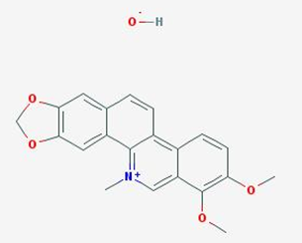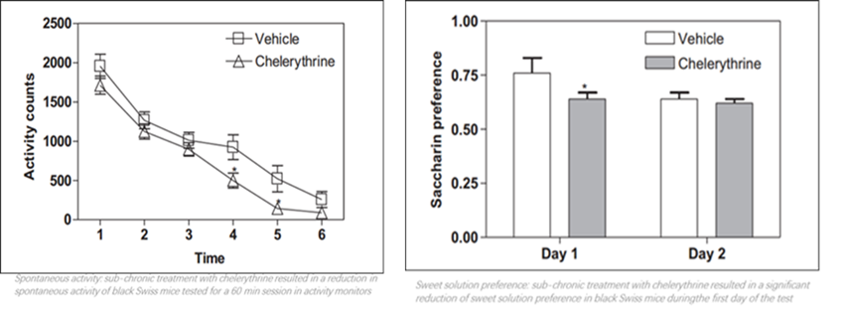
 nootro
nootro

 2017-10-31
2017-10-31

 0
0

 10654
10654
There are many studies at the molecular, biochemical, organism and clinical levels suggest that the inhibition of protein kinase C isomers (PKC) may be a possible novel approach for the treatment of bipolar disorder and specifically the mania pole of the disease[1].

Expand reading:Protein kinase C, commonly abbreviated to PKC , is a family of protein kinase enzymes that are involved in controlling the function of other proteins through the phosphorylation of hydroxyl groups of serine and threonine amino acid residues on these proteins, or a member of this family. PKC enzymes in turn are activated by signals such as increases in the concentration of diacylglycerol (DAG) or calcium ions (Ca2+). Hence PKC enzymes play important roles in several signal transduction cascades.
Like tamoxifen,an antiestrogenic drug,as a kind of the PKC inhibitor,it shows antimanic effects in animals and human[2-3].However, tamoxifen may not be the ideal drug for the treatment of patients with affective disorders because it has a variety of biological properties.So it is necessary to look for a better PKC inhibitor with less side effects, especially ones that can penetrate the blood-brain barrier(BBB).
Expand reading:The blood–brain barrier (BBB) is a highly selective semipermeable membrane barrier that separates the circulating blood from the brain and extracellular fluid in the central nervous system (CNS). The blood–brain barrier is formed by brain endothelial cells and it allows the passage of water, some gases, and lipid-soluble molecules by passive diffusion, as well as the selective transport of molecules such as glucose and amino acids that are crucial to neural function.

Some researches have proved that chelerythrine can also inhibit PKC and it is blood brain barrier (BBB) penetrable[4]. Then, the question is coming:
Dose chelerythrine ease mania-related behavioral?

To further evaluate this possibility,a study was designed to test the effects of peripheral (intraperitoneal) administration of chelerythrine in a battery of mania-related behavioral tests in black Swiss mice[5].
In this study,researchers tested spontaneous activity, sweet solution preference, elevated plus maze(EPM), forced swim test(FST), and amphetamine-induced hyperactivity of mice.The results showed that the peripheral administration of the PKC inhibitor chelerythrine had some effects in the spontaneous activity test and in the sweet solution preference test but no effects in the EPM, the FST or the amphetamine-induced hyperactivity test.

These results cannot strongly support an antimanic effect of chelerythrine ,but do suggest the possibility that it may have some effects on specific behavioral domains of mania
In addition, interestingly, a recent paper found that a higher dose administered in a more chronic regimen in rats, did reduce amphetamine-induced hyperactivity[6], indicating that above-mentioned study the dose might have been too low.
In summary, chelerythrine can may be used to treat bipolar disorder and ease manic-like behavior, certainly, additional dose and time response studies need to do to evaluate its range of activity.
Reference
[1] Zarate CA, Manji HK. Protein kinase C inhibitors: rationale for use and potential in the treatment of bipolar disorder. CNS Drugs 2009;23(7):569–82.
[2]Einat H, Yuan P, Szabo ST, Dogra S, Manji HK. Protein kinase C inhibition by tamoxifen antagonizes manic-like behavior in rats: implications for the development of novel therapeutics for bipolar disorder. Neuropsychobiology 2007;55(3–4):123–31
[3]Abrial E, Etievant A, Betry C, Scarna H, Lucas G, Haddjeri N, et al. Protein kinase C regulates mood-related behaviors and adult hippocampal cell proliferation in rats. Prog Neuropsychopharmacol Biol Psychiatry 2013;40–8.
[4]Cervo L, Mukherjee S, Bertaglia A, Samanin R.Protein kinases A and C are involved in the mechanisms underlying consolidation of cocaine place conditioning. Brain Res 1997;775(1–2):30–6.
[5] Einat H. Partial effects of the protein kinase C inhibitor chelerythrine in a battery of tests for manic-like behavior in black Swiss mice.[J]. Pharmacological Reports Pr, 2014, 66(4):722-725.
[6] ] Abrial E, Etievant A, Betry C, Scarna H, Lucas G, Haddjeri N, et al. Protein kinase C regulates mood-related behaviors and adult hippocampal cell proliferation in rats. Prog Neuropsychopharmacol Biol Psychiatry 2013;40–8.
Diabetes, often referred to by doctors as diabetes mellitus, des... More

 0
0

 0
0
According to research, myricetin stimulates glucose transport in... More

 0
0

 1
1
There are many studies at the molecular, biochemical, organism a... More

 0
0

 0
0
In vivo, betaine acts as a methyl donor for the conversion of h... More

 0
0

 0
0
Apigenin, an abundant dietary flavonoid, is emerging as a potent... More

 0
0

 0
0
BVC synergised with thiazolidinediones, which are synthetic PPAR... More

 0
0

 0
0
Epicatechin is an antioxidant flavonoid, occurring especially in... More

 6
6

 2
2
Fatigue is a very common phenomenon. There are many reasons can ... More

 2
2

 1
1
There are some simple steps can be taken to prevent or slow bone... More

 0
0

 0
0
Echinacea is also called the magic herb that can bring health to... More

 0
0

 0
0
Obesity has become a global health issue. It is a medical condit... More

 0
0

 0
0
Cardiac hypertrophy is the myocardial response to various pathol... More

 7
7

 1
1
Aging is becoming an international challenge to healthcare syste... More

 0
0

 0
0
Studies have shown that this compound possesses a plethora of b... More

 0
0

 0
0
Asthma is a common long-term inflammatory disease of the airways... More

 0
0

 0
0
